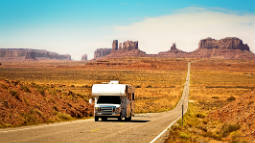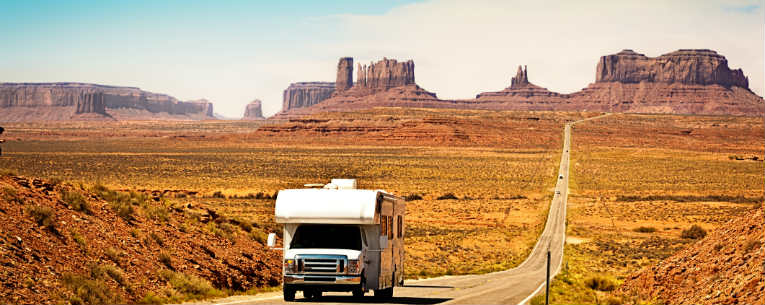If you love to travel, you’ve probably glanced at a motorhome barreling down the highway and wondered what full-time RVing is like. Would you thrive as a nomad? Or get bored spending months on the road?
You’re not the only one wondering. RV sales boomed in 2020, an increase driven largely by first-time buyers.1 Maybe this is your year to finally hit the road and try the RV life. First, here are a few important things you should know.
1. RV living can be super-luxe or really basic.
If the only recreational vehicle you’ve ever ventured into was your grandparents’ Winnebago, you’ll be amazed by the variety of models available today. Minimalist travelers like the adorable 13’ Scamp trailer and the sleek Basecamp from Airstream. On the high end, you’ll find the 45-foot American Eagle motorhome, with multiple flatscreen TVs, a king-sized bed, an electric fireplace and heated tile floors (retail price around $760,000). Or, if you’re a romantic at heart, consider a vintage camper with original birch paneling and Formica countertops.
In short, there’s an RV for every family and every budget. Overwhelmed? Full-time RVers Marc and Julie Bennett suggest listing your top three to five needs and choosing an RV that meets them. Love to cook? You’ll want bigger countertops and more cabinets. Need office space? Consider a cab that can be configured for a laptop desk and file storage.2
2. You can’t be a slob when you’re living in an RV.
The only way you can live in a small space for an extended period of time is if you keep it neat. You must do the dishes after every meal, make your bed every morning, and generally keep things shipshape. One unavoidable part of RV living is dealing with blackwater — that means sewage — and graywater, which is the water from your sink. Both must be disposed of regularly and responsibly, using dump stations at campgrounds, and the tanks have to be carefully maintained.3 If that sounds too gross to deal with, full-time RVing probably isn’t for you.
3. RV parks can be absolutely gorgeous.
RVers actually spend more time parked than they do driving.4 For comfort and convenience, an RV park is ideal. They offer water and sewage hookups, laundromats, bathrooms with showers, and sometimes cafés and swimming pools. Not all parks are created equal; a few stand out as amazing destinations in their own right. Camp amid palms and sea breezes at Sunshine Key RV Resort in the Florida Keys, or enjoy the lake views at Signal Mountain Campground in Wyoming’s Grand Teton National Park, suggest RV bloggers Heath and Alyssa Padgett.5
4. RV parks aren’t the only place you can camp.
A big part of RV life is boondocking, which means RV camping without hookups. Boondocking is a great way to experience perfect solitude in America’s wilderness: just you, your RV and the stars. Of course, there’s a right way and a wrong way to do it. Boondocking etiquette rules include:
• Pack out your trash and your blackwater.
• Observe restrictions on stay limits.
• Park on previously used campsites, when possible.
• Respect your RVing neighbors.
Harvest Hosts is a network of farms, orchards, ranches and wineries that welcome self-contained RVs (no external kitchens or graywater storage) to stay for a night. There’s no cost beyond the low annual membership fee.
5. Staying connected can be a challenge.
The WiFi networks at RV campgrounds are often feeble, so travelers seek out public networks at places like libraries, fast-food restaurants and coffee shops. On the road, most RVers depend on their mobile phone to serve as a WiFi hotspot, which means it’s essential to have a phone provider with good coverage across the country.
What about mail? Many people use the mail-forwarding service offered by Escapees RV Club, which can give you a mailing address, scan your mail, forward it to your current address and even read important letters to you over the phone.
6. If you commit to full-time RV living, you’ll need to choose a state as your domicile.
Even if you’re living in your RV more or less permanently, you still need a place to legally call home. It’s called your domicile — the state that issues your driver’s license, vehicle registration, jury duty summons, etc. Three states are considered ideal for RVers’ domiciles: Texas, South Dakota and Florida. These three have no state income tax, which is a big plus, and offer other perks like online renewal of your RV registration. Technomadia examines the pros and cons of establishing domicile in each state.
7. Full-time RVing can be done with pets — but it’s not always easy.
We’ve met RVers who travel with dogs, cats and even parrots. They recommend road-testing your pet first, to make sure he or she enjoys the experience and isn’t too stressed out. It helps to have dogs crate-trained, too, so they don’t get into your food or start chewing on the carpet when you leave them alone. Must-have supplies include extra food and prescriptions, a seatbelt harness and a pet first aid kit.6 Check pet policies at campgrounds before you pull in for the night and find out your dog’s not welcome. And if you’re traveling in the summer, never leave your pets alone in the RV unless you’re using (and have tested) the climate control system.
8. Travel insurance can help protect your RV vacation.
Most people think that travel insurance is only good for international trips. Nope! If you’re planning an extended RV road trip, you should buy travel insurance to protect your vacation investment. Trip cancellation/interruption benefits can reimburse you for non-refundable, pre-paid trip costs, such as RV rental costs and campground reservation fees, if you must cancel or cut short your trip for a covered reason. Look for a low-cost travel insurance plan that’s suitable for domestic travel, and check the maximum trip length for your plan before you buy. Get a quote from Allianz Partners.
9. Committing to the RV life requires a leap of faith.
There are a hundred reasons not to hit the road in an RV: your debts, your commitments, your comfort, your stuff… RVers will tell you there’s never a perfect time to go — you just have to do it. We think Becky Schade, a young woman who travels the country in her 17-foot Casita trailer, says it best: “The people who make the leap are those for whom the discomfort of change is outweighed by the discomfort of keeping things the way they are.”7
Related Articles








Share this Page